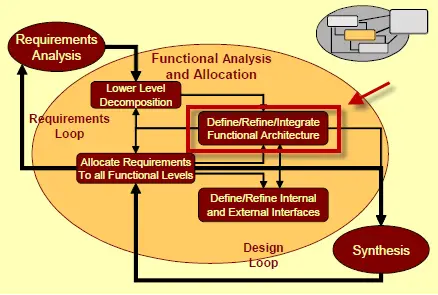A Functional Architecture is an architectural model that identifies system function and their interactions. It defines how the functions will operate together to perform the system mission(s). Functional architecture can be used as a framework to arrange information, processes, or other solution modules in an enterprise system.
Definition: A functional architecture is a set of functions and their sub-functions that defines the transformations of input flows into output flows performed by the system to achieve its mission. (SEBoK)
Types of Architectures
There is usually more than one architecture that can satisfy the requirements. Usually, each architecture and its associated allocated requirements usually have different cost, schedule, performance, and risk implications. The two most common architectures a system will have are:
- Functional Architecture
- Physical Architecture.
Purpose of Functional Architecture
The purpose of the functional architecture is to support functional and performance test development. It also supports system development, along with the physical architecture, of verification tasks that are defined to verify the functional, performance, and constraint requirements.
Benefits of a Functional Architecture
A functional architecture promotes efficient system design, development, and maintenance by streamlining the process of identifying system functions and their interactions. The process of identifying system functions and their relationships can be improved in several ways by using a functional architecture:
- Clarity: A functional design makes it simpler to comprehend the goal and behavior of the system by providing a concise and ordered representation of system functions.
- Scope and Completeness: It makes sure that all necessary tasks are recognized and stated, avoiding the omission of any significant details.
- Interdependencies: By showing how functions interact, it makes the system’s interdependencies clear, allowing for greater coordination and integration.
- Communication: It is a visual communication tool that helps stakeholders work together effectively and reduces misunderstandings.
- Conditions Validation: By comparing system requirements to intended functionalities, the functional architecture helps ensure that design and development are in line with the anticipated results.
- Iterative development: identifies potential gaps and potential areas for improvement, allowing for incremental enhancements and encouraging agile development methodologies.
- Risk Management: Understanding how different processes interact makes it easier to spot possible hazards and trouble spots, which enhances risk management.
- Scalability: The functional design helps to clarify how new functions can be introduced or current ones updated without causing systemic disruption.
- Performance Optimization: Interaction analysis can result in function optimization, enhancing system effectiveness and efficiency.
- Change management: It establishes a baseline for managing changes, facilitating the evaluation of the effects of changes and guaranteeing system stability throughout upgrades or modifications.
Requirements Decomposition
During the Functional Analysis and Allocation step, the functional requirements identified in the Requirements Analysis step are decomposed and their associated performance requirements into sub-functions to the point that they can be unambiguously related to the system elements or products that make up the design that flows out of a later step. The result is often called functional architecture. [1]

SMC Systems Engineering Handbook, Figure 15
Compliance
In the Design Loop, synthesized designs are compared with the originating architectures and allocated requirements to assure compliance or to initiate re-evaluation. Sometimes it is necessary to drive toward optimal solutions by presenting various functional views, including those that depict functional relationships with existing assets, to enable more thorough assessments of plausible solutions. [1]
AcqTips:
- The DoDAF descriptions in this website are very generic and are mostly taken from the DoDAF Architecture Framework website. Make sure you visit the actual website for the most update information and a more thorough explanation of each viewpoint.
- DoDAF Version 1.0, although outdated, has some good examples on how to construct AV’s, OV’s, and SV’s.
AcqLinks and References:
- [1] DoDAF Architecture Framework Version 2.02
- DoD Architecture Framework Working Group Version 1.0, Volume 1: Definition and Guideline, 9 Feb 04 (Old Version)
- DoD Architecture Framework Version 1.0, Volume 2: Product Description, 9 Feb 04 (Old Version)
- Website: DoDAF Architecture Framework – DoD Deputy Chief Information Officer
- Website: DoDAF Version 2.02 Journal
- Website: DoDAF Meta Model (DM2)
- Website: DoD Information Enterprise Architecture
- Website: OMB Enterprise Architecture Assessment Framework (EAAF)
Updated: 7/31/2023
Rank: G1.1
